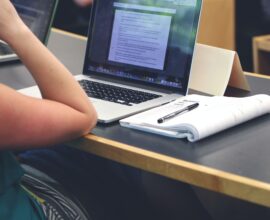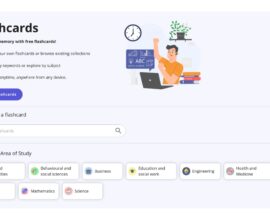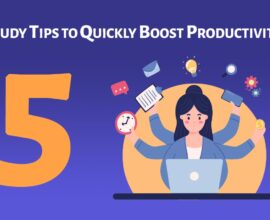The Top 8 Productivity Killers for Students To Avoid

Productivity-sapping habits are a significant challenge for most students.
Just think about these numbers. 48.4% of college students believe they don’t have enough time for completing their schoolwork. That’s because productivity killers put a major strain on your ability to manage your time and get essential tasks done. This can make you fall behind on your coursework, increase burnout, and leave you feeling overwhelmed.
In this article, we’ll offer you a quick rundown of the top productivity-killing behaviours and teach you how to overcome them for good:
1. Letting Homework and Assignments Pile Up
Even if doing homework and assignments isn’t the most exciting way to spend your downtime, procrastinating only makes matters worse. When the workload you’ve been putting off comes due, you’ll be stressed and find it difficult to get time for sleeping, unwinding or doing the things you love—since you’re too busy playing catch-up. It’s also easy to procrastinate further when you’re overwhelmed, as you may not know where to start.
Procrastination happens to almost every student, so don’t beat yourself up. Instead, use these simple strategies to catch up on late assignments and avoid getting into the trap of piled up work in future:
- Create a checklist to keep track of every assignment that you need to accomplish and prioritise your list based on due dates
- Create a study timetable that allows you to set aside a specific time every day to work on your homework and assignments
- Find a study location that helps you remain focused and productive
- Reward yourself when you finish a task on your list
2. Making an Unrealistic To-Do List
Wishful thinking happens when students build to-do lists, especially when they want to do more work in a day than is realistic. You’ll experience disappointments, frustrations, and demotivation if you frequently set unrealistic to-do lists.
Here are some simple tips that can help you make a manageable to-do list every day:
- Write down your list. You can use a paper planner with checkboxes or use task management apps for students like Todoist and Remember The Milk
- Estimate the amount of time required to complete each task. Giving yourself enough time to complete each task will help you avoid procrastination or a mid-day productivity slump
- Calculate the total time it’ll take to accomplish all the items on your list. Aim for three to five tasks daily at the most
- Add each task to your calendar to ensure you know when you will complete each activity
- Use time-tracking apps for students like Toggl Track or RescueTime to find out the amount of time you actually take to accomplish an activity and compare it to your estimated time
When you compare the difference between the amount of time you estimated and the actual time it took to accomplish an activity, you’ll increase your ability to plan better in the future and become a more productive student!
3. Trying To Do Large Activities in One Go
Large tasks can be intimidating and increase our likelihood of procrastinating. If you try to complete a huge project or task in one step or sitting, the task may seem undoable. This can also increase stress and reduce your motivation to get the work done.
That is why breaking down complex tasks is an important strategy to master when learning how to be productive in college.
Breaking huge activities into smaller and manageable chunks makes them seem approachable and less intimidating. Any bigger project can be broken down into smaller to-dos that will take minutes or a few hours to complete. For example, if you are writing an assignment, you can list the steps you’ll need to take, like conducting research, writing the first draft, editing, proofreading, etc.
Focusing on one task at a time and ticking off the items on your list will give you a sense of achievement and increase your confidence in handling complex tasks.
4. Not Taking Regular Study Breaks
Learning or studying for long hours without breaks can reduce your overall concentration and efficiency. It can also increase frustrations and the risk of health issues like stress, anxiety, and fatigue. That is why schools and universities will schedule student breaks between classes to give students time to process the information learned and refresh.
Taking regular breaks when studying is one of the best ways to boost productivity. It will help you retain information quickly, increase alertness, refresh your mind, and reduce stress.
The length of your study break will depend on the duration of your study sessions. For instance, you can use the Pomodoro Technique, in which you’ll study for 25 minutes and take a five-minute break.
Some of the ways you can spend your breaks to ensure you feel refreshed when you sit back to study include eating some healthy snacks, having a power nap, stretching, or going for a short walk.
5. Not Mastering Your Peak Performance Time
Your energy levels change throughout the day and directly affect your productivity. If you don’t master your prime time and take advantage of those precious hours, you’ll take longer than necessary to accomplish even simple tasks.
Observe your energy levels and use that to plan your days. If your energy levels are high in the morning, schedule the hardest tasks during morning hours and keep the ones that require less focus for your off-peak hours.
Mastering your energy levels throughout the day and combining that with effective time management strategies will boost your productivity. On the other hand, forcing yourself to work outside your peak time just sabotages your productivity. Find the timeframes of the day that work best for you!
6. Browsing Websites and Engaging on Social Media While Studying
Digital devices are helpful in many ways but can also be a major source of distraction for students. All it takes is to check the notifications or respond to messages, and before you know it, you’ve wasted an hour or more time on social media. Such interruptions are time-consuming, and it can take an average of 23 minutes to regain your focus once it’s lost.
If you don’t need to use your digital devices (smartphone or laptop) during your study session, keep them away, turn them off, or mute notifications.
If you must use your devices, for example, when conducting research or attending online classes, take advantage of productivity apps and software for students. They will let you block websites and applications—like social media sites YouTube, Facebook, and Instagram—for a set amount of time. Some of the apps and tools you can use include StayFocusd, Forest, Limit, and Freedom.
7. Eating Unhealthy Foods
What you eat impacts your productivity more than you might think! Unhealthy foods can slow down your cognitive processing, interfere with your focus and leave you feeling sluggish following ‘sugar rushes’ or ‘caffeine highs’. In addition, regularly consuming junk food can lead to short and long-term health complications, including weight gain, diabetes and heart problems.
On the other hand, eating a balanced diet of healthy foods improves your cognitive performance and supports your overall health. You should create a schedule that makes it easy for you to eat healthy foods frequently, for instance:
- Decide what you will eat before you become hungry. You’re more likely to make healthy eating decisions when you’re full than when hungry
- Eat small and frequent meals throughout the day. This ensures you maintain consistent glucose levels throughout the day, which is important for boosting productivity and brainpower
- Stock healthy snacks, such as protein bars, almonds, and fruits to make them easily accessible
8. Not Getting Enough Sleep
Trying to get extra time out of your day by cutting back on sleep is counterproductive. Even if you manage to complete some tasks by pulling all-nighters, the lack of sleep will decrease your productivity the next day.
Lack of enough sleep will impair your mood, judgment, and working memory. This means you’ll have difficulties learning, focusing, and recalling what you’ve learned.
Here are some tips to help you improve your sleep quality and become a more productive student:
- Sleep for seven to eight hours every night
- Avoid using your phone and other electronic devices while in bed
- Wind-down by engaging in relaxing things like listening to music, meditating, or stretching
- Maintain a regular sleep-wake routine
Bottom Line
Finding a productivity system that works for you will take some experimenting. The secret is to keep going—even if you fall behind at some point—until you figure out what works for you and avoid what doesn’t work for anyone. You can speed up the process by implementing the productivity tips outlined in this guide.
Try our online learning platform, Zookal Study, if you want to supercharge your learning. You’ll access the right tools and resources to help you succeed, such as flashcards and test prep. Our well-vetted tutors are also available 24/7 to help you with your homework if you get stuck.




